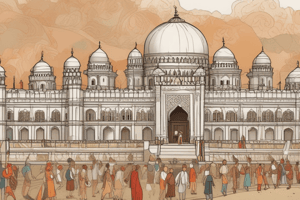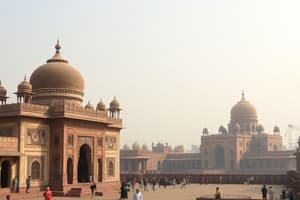Podcast
Questions and Answers
What primary challenge does the region in Hindustan face regarding water availability?
What primary challenge does the region in Hindustan face regarding water availability?
- Excessive rainfall leading to flooding
- Lack of running waters in cultivation areas (correct)
- Overuse of irrigation devices
- Water scarcity during autumn crops
How do farmers in Lahore, Dipalpur, and similar regions irrigate their crops?
How do farmers in Lahore, Dipalpur, and similar regions irrigate their crops?
- By using a system of canals
- By employing buckets and wheels (correct)
- Through the use of advanced machinery
- Through natural rainfall only
What is the mechanism used to draw water from wells in the irrigation system described?
What is the mechanism used to draw water from wells in the irrigation system described?
- A wheel that is turned by bullocks (correct)
- A hand pump connected to pipes
- A gravity-fed channel system
- A siphoning method with hoses
What is the function of the trough in the irrigation system mentioned?
What is the function of the trough in the irrigation system mentioned?
Which crops benefit from the water management techniques described in the Babur Nama?
Which crops benefit from the water management techniques described in the Babur Nama?
What materials are used to create the irrigation device observed in Lahore and Dipalpur?
What materials are used to create the irrigation device observed in Lahore and Dipalpur?
What agricultural innovation is depicted in the irrigation systems described?
What agricultural innovation is depicted in the irrigation systems described?
What role do bullocks play in the irrigation techniques observed?
What role do bullocks play in the irrigation techniques observed?
What was the housing situation for menials like the halalkhoran in Muslim communities?
What was the housing situation for menials like the halalkhoran in Muslim communities?
Which caste sought Rajput status in the seventeenth century around Vrindavan?
Which caste sought Rajput status in the seventeenth century around Vrindavan?
Which castes were mentioned as having risen in social hierarchy due to profitable activities?
Which castes were mentioned as having risen in social hierarchy due to profitable activities?
What was the role of the panchayat in a village?
What was the role of the panchayat in a village?
Who typically led the village panchayat?
Who typically led the village panchayat?
What was a common characteristic of village panchayats in mixed-caste villages?
What was a common characteristic of village panchayats in mixed-caste villages?
What was the likely representation of manual-cum-agricultural workers in the panchayat?
What was the likely representation of manual-cum-agricultural workers in the panchayat?
Which caste in eastern regions acquired the status of peasants?
Which caste in eastern regions acquired the status of peasants?
What was the first stage in the Mughal land revenue arrangements?
What was the first stage in the Mughal land revenue arrangements?
What does 'jama' refer to in the context of Mughal revenue collection?
What does 'jama' refer to in the context of Mughal revenue collection?
Which type of land is described as land that is uncultivated for five years or more?
Which type of land is described as land that is uncultivated for five years or more?
What was one of the instructions given by Aurangzeb to his revenue officials in 1665?
What was one of the instructions given by Aurangzeb to his revenue officials in 1665?
Which type of land is cultivated annually for each crop and never left fallow?
Which type of land is cultivated annually for each crop and never left fallow?
How did Akbar prefer cultivators to make payments for taxes?
How did Akbar prefer cultivators to make payments for taxes?
What was a common challenge to the Mughal state when trying to realize tax claims?
What was a common challenge to the Mughal state when trying to realize tax claims?
Which of the following types of land is left out of cultivation temporarily to recover its strength?
Which of the following types of land is left out of cultivation temporarily to recover its strength?
What is the meaning of 'kan' in the context of kankut?
What is the meaning of 'kan' in the context of kankut?
Which of the following methods is likely to be the most reliable for assessing crops?
Which of the following methods is likely to be the most reliable for assessing crops?
What was a key reason for Aurangzeb instructing a detailed survey?
What was a key reason for Aurangzeb instructing a detailed survey?
Which term refers to the division of crops after they have been reaped and stacked?
Which term refers to the division of crops after they have been reaped and stacked?
In evaluating the 'jama', which aspect was emphasized by Aurangzeb?
In evaluating the 'jama', which aspect was emphasized by Aurangzeb?
What is the main drawback of the batai method according to Aurangzeb's observation?
What is the main drawback of the batai method according to Aurangzeb's observation?
Which of the following empires was NOT mentioned alongside the Mughal Empire?
Which of the following empires was NOT mentioned alongside the Mughal Empire?
How did the Mughal's land revenue system demonstrate flexibility?
How did the Mughal's land revenue system demonstrate flexibility?
How did zamindars influence the agrarian economy in Mughal India?
How did zamindars influence the agrarian economy in Mughal India?
Which statement best describes the role of panchayats in rural society?
Which statement best describes the role of panchayats in rural society?
What was a significant change for forest dwellers during the sixteenth and seventeenth centuries?
What was a significant change for forest dwellers during the sixteenth and seventeenth centuries?
What was one of the primary roles of zamindars in relation to the peasants?
What was one of the primary roles of zamindars in relation to the peasants?
Which aspect of agrarian relations did caste most significantly influence?
Which aspect of agrarian relations did caste most significantly influence?
What kind of economic link did the Mughal Empire primarily establish?
What kind of economic link did the Mughal Empire primarily establish?
How did village headmen contribute to rural governance?
How did village headmen contribute to rural governance?
What was one of the main roles of the panchayat in regulating rural society?
What was one of the main roles of the panchayat in regulating rural society?
Study Notes
Irrigation Techniques in Mughal India
- Babur, founder of the Mughal Empire, notes in his memoir Babur Nama that a majority of the land in northern India is flat, with limited access to running water.
- He describes the use of water wheels and buckets to irrigate crops and orchards, especially during the dry season.
- To draw water from wells, two circular ropes with wooden slats attached were used to secure pitchers, forming a chain that hung from the wheel-well.
- Different systems were used in various regions:
- Water wheels were common in Lahore and Dipalpur.
- Buckets and ropes attached to rollers were used in Agra, Chandwar, and Bayana.
- These irrigation techniques required the use of draft animals like bullocks for power.
Mughal Land Revenue System
- The Mughal state prioritized collecting accurate information about the extent of agricultural lands and their production.
- Land revenue collection consisted of two stages:
- Assessment: Estimating the amount due (jama).
- Collection: Actual collection of the assessed revenue (hasil).
Akbar's Land Revenue Policy
- Emperor Akbar's Ain-i-Akbari included information on revenue collection practices.
- Akbar allowed for payment of revenue in both cash and kind (grain).
- He emphasized the importance of measuring cultivated and cultivable land in each province to ensure accurate assessment.
Aurangzeb's Land Revenue Policy
- Aurangzeb instructed his revenue officials to conduct annual surveys to assess the number of cultivators and the conditions of cultivation in each village.
- This detail-oriented approach aimed to ensure a more accurate and equitable revenue system.
Land Classification under Akbar
- Akbar categorized lands according to their fertility and usage:
- Polaj: Land cultivated annually, never left fallow.
- Parauti: Land allowed to recover its fertility for a period.
- Chachar: Land left fallow for 3-4 years.
- Banjar: Land uncultivated for 5 years or more.
Mughal Revenue Officials
- Amin: An official responsible for implementing imperial regulations and conducting land surveys in the provinces.
- Amil-guzar: The revenue collector, who was responsible for collecting the assessed amount from cultivators.
- The Ain outlined procedures and instructions for these officials to ensure fair revenue collection.
Mughal Era Agrarian Society
- Social stratification was significant in Mughal India, with distinct caste groups:
- Menials: Such as halalkhoran (scavengers) and mallahzadas (boatmen) occupied the lower strata of society.
- Intermediate Castes: Groups like Rajputs, Jats, and Gauravas occupied a middle ground, with varying levels of status and access to land.
- Higher Castes: Castes such as Ahirs, Gujars, and Malis gained status due to their profitable activities in cattle rearing and horticulture.
Village Panchayats
- Panchayats were village assemblies composed of elders, usually influential individuals with hereditary land rights.
- They represented different castes and communities, though lower strata of society, including agricultural workers, were unlikely to have a voice.
- Panchayats played a significant role in regulating village life, making decisions that were binding on members.
- These assemblies were headed by a headman known as muqaddam or mandal.
Significance of the Mughal Land Revenue System
- The system aimed to ensure fairness and efficient collection of revenue.
- It promoted economic development and stability within the empire.
- The system encouraged the expansion of agricultural production and the cultivation of new land.
- However, the system faced challenges based on local conditions and sometimes led to disparities in revenue burden among different groups.
Studying That Suits You
Use AI to generate personalized quizzes and flashcards to suit your learning preferences.
Related Documents
Description
Explore the irrigation methods used in Mughal India as described in Babur's memoir, the Babur Nama. This quiz delves into the various techniques employed for cultivating the land and the Mughal land revenue system that supported agriculture. Test your knowledge on the innovative practices that facilitated crop production in a predominantly flat northern India.



